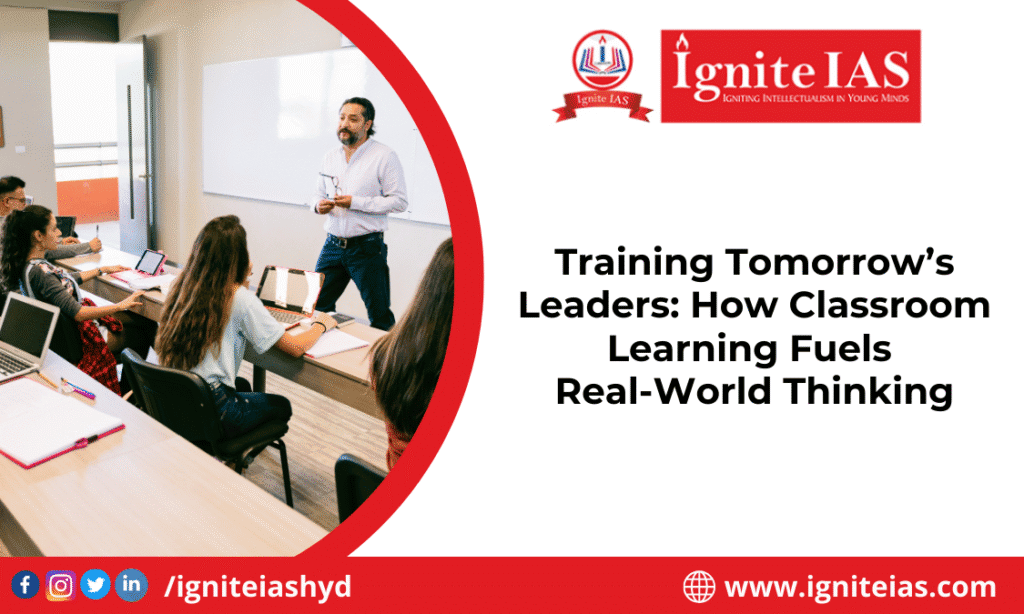Introduction
What if your classroom could be more than just a place to memorize facts? What if it could be a launchpad for leadership, a space where knowledge meets purpose?
At Ignite IAS, this is not just a concept—it’s a reality. We believe that India’s future administrators shouldn’t just study books—they should think, question, and evolve into problem-solvers. By connecting classroom learning with real-world relevance, we help students become not just UPSC aspirants, but visionary leaders.
Let’s explore how Ignite IAS—widely known as the Best UPSC Coaching in Hyderabad—nurtures this transformation every single day.
The Changing Role of a Classroom
Gone are the days when classrooms were limited to blackboards and notes. In today’s world—especially in UPSC preparation—classrooms must evolve into idea labs where theories are applied, challenged, and reimagined.
At Ignite IAS, our classrooms encourage:
- Open discussions
- Real-time debates
- Application-based assessments
It’s not about memorizing; it’s about understanding and leading.
Beyond Textbooks: Why Real-World Thinking Matters
UPSC preparation is not just academic—it’s intellectual, emotional, and social.
A civil servant must:
- Make real-world decisions
- Think beyond rules
- Understand people’s problems
- Stay solution-oriented under pressure
This kind of mindset is built slowly, and starts in the classroom.
How UPSC Demands More Than Academics
Cracking the UPSC requires:
- Ethical reasoning
- Administrative aptitude
- Socio-political awareness
- Emotional intelligence
That’s why Ignite IAS ensures that every lesson has a real-world connection—whether it’s relating history to modern governance or using geography to understand disaster management.
The Ignite IAS Learning Philosophy
Our goal isn’t just to train toppers—it’s to build nation-builders. Our classrooms:
- Encourage dialogue, not monologue
- Replace rote with reflection
- Train minds to solve, not just study
By weaving leadership values into every subject, we train students to become civil servants with conscience and clarity.
Critical Thinking: The Core of Leadership
UPSC aspirants must develop the ability to:
- Ask the right questions
- Challenge assumptions
- Analyze issues from multiple angles
Through structured debates, daily editorials, and issue breakdowns, Ignite IAS builds this muscle daily in the classroom.
Interactive Learning Tools and Methods
We make learning engaging and dynamic using:
- Smart boards and digital tools
- Mind maps and flow charts
- Mock press conferences and panel simulations
- Video-based learning for current events
This keeps students alert, involved, and inspired to think beyond exams.
Group Discussions and Public Speaking
Leadership begins when students find their voice.
At Ignite IAS, we organize:
- Weekly group discussions on national/international issues
- Public speaking sessions
- Impromptu debates and mock interviews
This builds confidence, communication skills, and perspective—essential for both Mains and the Personality Test.
Real-Time Case Studies and Scenario-Based Learning
Reading about poverty is one thing. Solving a mock crisis in a classroom is another.
We simulate real-world problems through:
- Case studies from governance, ethics, and economics
- Role plays as collectors, commissioners, or social workers
- Debriefs to reflect on actions and consequences
This bridges classroom theory with field reality.
Field Exposure and Community Engagement
Books can’t teach empathy. Experience can.
Ignite IAS regularly takes students for:
- Village immersion programs
- Urban planning surveys
- NGO collaborations
- Sanitation and civic awareness drives
These field trips make students more sensitive, responsible, and practically informed.
How Current Affairs Connect the Dots
We teach students to:
- Link current issues to GS syllabus
- Use real events in essay/ethics answers
- Understand governance through news stories
Every class begins with a current affairs discussion, ensuring students stay in touch with reality while preparing for theory.
Mentorship that Moulds Mindsets
Each student is assigned a mentor—often a retired IAS/IPS officer—who:
- Shares administrative experiences
- Corrects perspectives and biases
- Trains students in ethical, people-centric leadership
This one-on-one connection helps students learn the real meaning of service.
Conclusion
A civil servant isn’t born—they’re trained, shaped, and guided. And that journey starts in the right classroom.
At Ignite IAS, we blend UPSC prep with leadership learning, ensuring our students are not just exam-ready but nation-ready. Because when knowledge meets application, and learning meets leadership—India gets the administrators it truly deserves.
Admissions Open 2025-26
📞 Contact Us: 7997992479 / 80 / 81
🌐 Visit: www.igniteias.com
FAQs
1. How is classroom learning different at Ignite IAS?
We focus on real-world thinking, leadership skills, and application—not just rote learning. Our classes include discussions, debates, and case-based learning.
2. Does Ignite IAS offer field exposure programs?
Yes. Students participate in village visits, urban surveys, and civic projects to apply what they learn in the real world.
3. How does this approach help in UPSC preparation?
It sharpens answer-writing, ethics, interview performance, and overall understanding of governance and society.
4. Are mentors part of the learning system?
Absolutely. Each student is assigned a mentor who offers guidance, administrative insights, and moral support.
5. Can I join Ignite IAS right after Class 10?
Yes. We offer integrated junior college + UPSC coaching programs that blend academics with UPSC foundation and leadership development.


